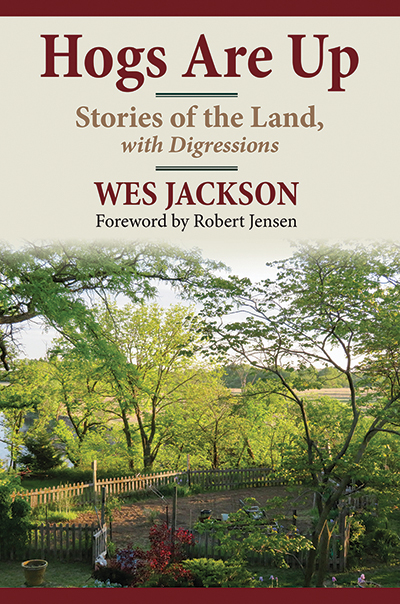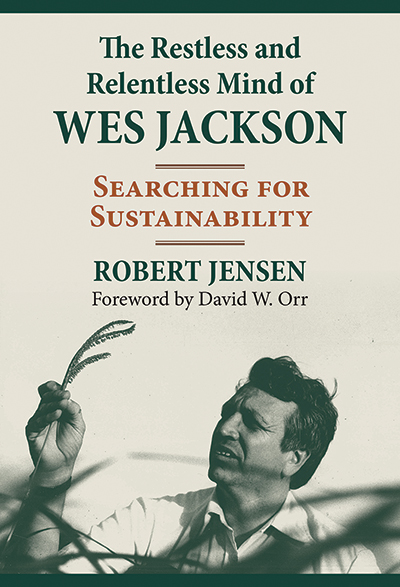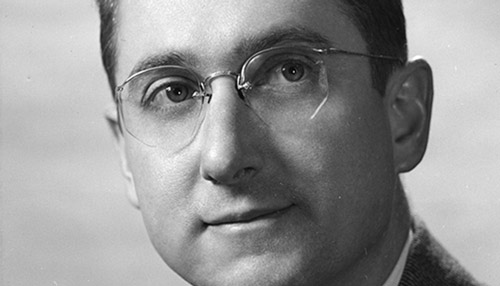Jacksonia
Books by and about Wes Jackson trace personal and philosophical journey of an American original

Wes Jackson recalls the Topeka farm where he was born, in 1936, as “an agricultural paradise, with an abundance of plants for food, for flower gardens, for beauty.” In that way it’s typical of the Depression and familiar to advocates of today’s local food ethic: Strawberries, blackberries, asparagus, rhubarb, radishes, tomatoes, peas, carrots, onions and forage like sweet clover and alfalfa for horses, mules, milk cows, hogs and chickens were tended by men, women and children who provided the hard work needed to keep crops growing and weeds at bay. “It was local and largely, but not completely organic,” he writes in Hogs Are Up: Stories of the Land, with Digressions. “People ate what was in season,” and got through the cold months on produce canned in summer and meat butchered in fall and winter.
Much of that plant, animal and human diversity has disappeared from rural America. But Jackson, g’60, MacArthur Fellowship-winning founder of The Land Institute in Salina, isn’t waxing nostalgic for a lost golden age of farming. His frame of reference is far too broad for that, taking in deep geologic time and man’s own brief run of days through the eons, all the way back to our Paleolithic origins as hunter-gatherers. Seen through this wide viewfinder, farming (even farming in the Edenic agrarian mode envisioned by Thomas Jefferson on his Virginia mountaintop) becomes what Jackson calls “the problem of agriculture.” Agriculture, in other words, isn’t the answer to our many ecological, cultural and social ills; it’s the root of them.
This realization came early, when, at 16, Jackson worked for the summer on a South Dakota grassland ranch owned by relations. The introduction to the prairie ecosystem that would become the focus of his life’s work suggested two ways to experience land. “One, which became known later to me as the Jeffersonian agrarian ideal, was where culture dictated that ground be plowed, worked, and planted,” he writes. “The other, rangeland life, was where the plow had no place and was even anathema. I preferred the grassland.”
For more than 40 years, Jackson led the Land Institute’s quest to develop a new agricultural model based on perennial grains that combine the biodiversity of prairie systems with the high yields of annual crops, all delivered by deep-rooted plants that eliminate tillage and contribute to building, rather than eroding, precious soil. He envisions a biodiverse plant community that’s the opposite of the corn-and-beans monoculture that dominates great swaths of the heartland. It’s an approach that, to borrow Jackson’s typically pithy phrasing, relies more on the cleverness of nature than the cleverness of man.

While doing this important work to improve agriculture, the well-known sustainability advocate (whom KU awarded an honorary doctorate of science in 2013 for notable contributions to the environment) also began questioning the assumptions on which modern life is built: consumerism, growth economics, reliance on technology and fossil fuels, and an industrial farming model that separates ecology and agriculture into warring camps that work least well for farmers and consumers and best for corporate middlemen. His conclusion: As a species we need to curb consumption, need to “power down” and wean ourselves off the easy energy of dwindling fossil fuels “while we still have slack”—in farming, yes, but also in nearly every facet of our lifestyle. “We’ve lived with the assumption that there’s always more,” Jackson writes. “But I believe the future is going to be defined by living within limits, with learning to adapt to less.’
Hogs Are Up sketches the backstory to the braided, iconoclastic worldview of a man who grew up with a hoe in hand, trained as a botanist and geneticist, and deeply engaged with books and people who, each in their own way, have something to teach a curious mind. Jackson is a gifted storyteller, and his tales feel at times like simple recollections and at others like environmental parables—elliptical stories that often begin and end with questions, and whose frequent digressions aren’t beside the point but usually are the point.
Alongside this survey of the people and places that shaped Jackson’s intellectual journey, The Restless and Relentless Mind of Wes Jackson, by Robert Jensen, University of Texas professor emeritus of journalism, stands as an up-to-date primer on the ideas themselves, synthesizing Jackson’s philosophy in one compact package. “It’s the book I wanted you to write, but you were busy with other things,” Jensen told Jackson during an online conversation hosted in April by Lawrence’s Raven Book Store, “so I wrote it.” Jackson has explored these ideas extensively in a generous handful of books, but Jensen deftly hits the highlights, combining a journalist’s ear for Jackson’s memorable phrases with a clear analysis of his crucial insights about mankind and the natural world. Writing about a key moment after Jackson left a plum job in academia to return to Kansas, for instance, Jensen describes the breakthrough insight of how his home state’s wheat fields might mimic the self-sustaining prairie as “the simple but revolutionary idea of pulling agriculture back toward nature’s circle.” That description sums up perfectly the balance of boldness and humility in Wes Jackson’s work.

“For longtime readers of Jackson, many of the phrases will be familiar but may be organized in a new way that can spark new thinking,” Jensen writes. “For those unfamiliar with his work, the book can serve as an introduction to the worldview that Jackson has built from a lifetime of experience, drawing on a range of disciplines.” Read together, the two texts crackle with the spark of an original mind always pushing (restlessly, relentlessly, but also playfully) against assumption and accepted wisdom. Here gambols man’s cleverness, to be sure, but in service of the seriously radical idea that perhaps Mother Nature knows best after all.
RELATED ARTICLES
/








